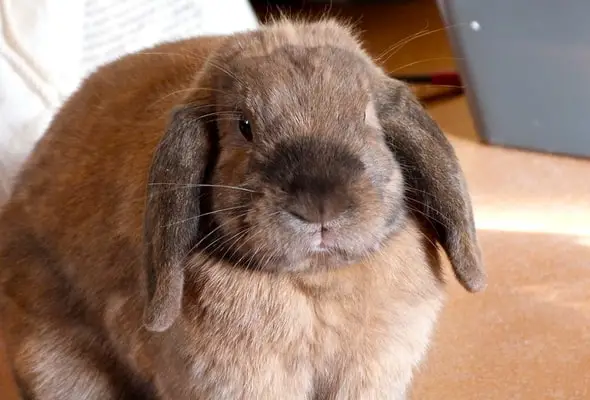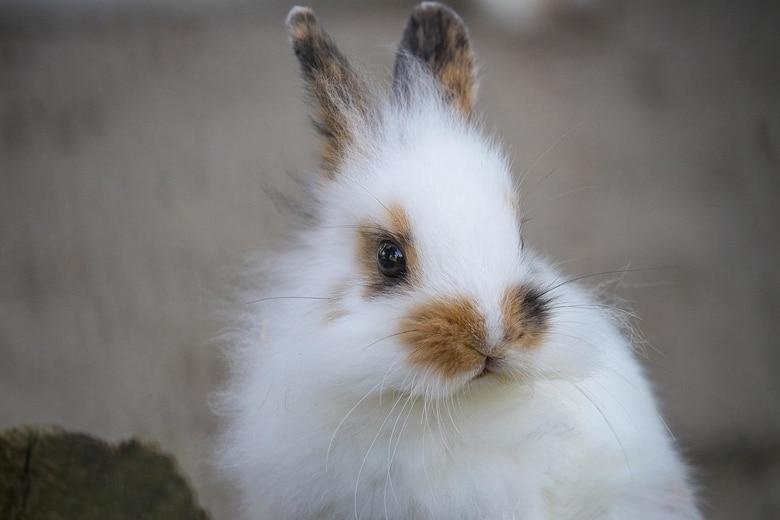Rabbits are peculiar creatures in a lot of ways. Many would-be owners are surprised by their delicacy or shocked to discover that they cannot bathe a bunny as they would another type of pet. One of their idiosyncrasies is how quiet they are.
As they can’t bark or meow to express how they’re feeling or to signal a need, owners must become fluent in bunny body language and decoding the small sounds their rabbit emits. This raises the question, do rabbits have vocal cords?
Do Rabbits Have Vocal Cords?
Rabbits have a larynx, which functions as their voice box, enabling them to produce some sound. Inside the chamber of the voice box is a pair of membranous folds, the vocal cords, which extend between the thyroid above and arytenoid cartilages below.
Although rabbits possess rudimentary vocal cords, they do not vocalize loudly or regularly. As prey animals, rabbits in the wild are vulnerable to an array of predators, including owls, eagles, hawks, crows, snakes, foxes, raccoons, coyotes, and wolves.
Their endurance as a species is attributable to their ability to remain relatively silent. This is in addition to their ability to run at speeds of up to 45 miles per hour, and their proclivity for running in a zig-zag pattern to evade their pursuers.
Rabbits do utilize their vocal cords under certain circumstances, which we will elaborate upon further. A conscientious rabbit owner must learn to recognize and interpret the different bunny sounds in order to keep their pet happy and healthy.
A rabbit may vocalize because they are experiencing joy, pain, terror, discontent, illness, or sexual desire. They use their somewhat limited vocal capacity to communicate with humans and other animals alike.
What Vocal Sounds Do Rabbits Make?
The most important aspect of interpreting your pet rabbit’s sounds is to understand that rabbits only make loud sounds when they are severely distressed. A rabbit’s scream will sound almost exactly like a child’s scream and is a call to immediate action.

If you hear your pet bunny scream, check for any injuries or dangers in the environment, and attend to those if possible. If no apparent injury or cause can be determined, pay close attention to your rabbit for at least a couple of hours, and monitor their distress.
There are numerous vocalizations you may hear from your rabbit, and each can be interpreted differently. Your rabbit may squeal, whimper, grunt, growl, snort, hiss, cluck, honk or oink. We will elaborate upon these in subsequent sections.
It is worth noting that rabbits issue a lot of non-verbal cues to assist in their communication. These include thumping with their hind legs to indicate displeasure, softly grinding their teeth to show contentment, rubbing their chins on objects or people to mark their territory, and circling your feet to court you.
Do Rabbits Vocalize a Lot?
Rabbits are quieter animals, an evolutionary tactic they developed to protect themselves in the wild. Although they do not typically make loud sounds unless they are in distress, they do sometimes vocalize in a variety of different ways.

A rabbit squeal or ‘squeak’, refers to a high-pitched, short sound. Commonly, this indicates anxiety or stress, especially when accompanied by the bunny cowering or running around the house or enclosure.
Keeping in mind that rabbits are easily frightened, the trigger of a rabbit’s squeal could be something as simple as a sudden noise, or the unexpected movement of someone or something in their environment.
Conversely, a rabbit may also emit a squeak when they are happy or content. Being mindful of what is in your rabbit’s immediate environment and any potential stressors will enable you to decipher their vocal signals.
A rabbit may whimper to signal unhappiness, and often it occurs as a response to a person, animal, or situation that makes them uncomfortable. In this case, it is best to remove them from the environment if possible.
A bunny who feels threatened or angry may growl, hiss or grunt. This is often the case when they want to be left alone, or when they want to protect their food or territory from other bunnies or human hands!
Are Rabbits Loud?
As we have discussed, rabbits are notoriously quiet pets. For many owners, this is part of their unique appeal. However, they are adept at expressing themselves through both the language of their bodies and the minimal vocalization they have evolved to have.
With this in mind, rabbits can be loud through their physicality. A rabbit who has not had enough exercise may thump against or rattle the bars of its enclosure. Ensuring your rabbit has ample space to play is essential to keeping them happy.
Rabbits will also thump when they are afraid, or sometimes just because they want some attention. As always, it is necessary to be mindful of whether there are any potential stressors in the environment and eliminate them if possible.
Rabbits will also thump because they feel neglected or want attention. Setting aside at least a half-hour of daily playtime with your bunny will help prevent them from getting bored or restless and making extraneous noise.
Can Rabbits Communicate With Each Other?
Rabbits not only communicate with each other, but with their owners as well. When it comes to bunny to bunny contact, honking is the cue to pay attention to. Soft honking occurs when a rabbit wishes to demonstrate their sexual interest in another rabbit.
If an unneutered rabbit honks in the presence of another bunny, or you, it is because they want to initiate mating. However, a neutered rabbit may honk simply because they are having a good time!
Another common vocalization between rabbits is the grunt. If a rabbit grunts at another, it typically means that they don’t want to share their space with them. A grunt in bunny means “back off”! If you have two rabbits that grunt at one another, they have likely failed to bond, and both consider themselves the alpha.
Thumping is also an integral aspect of communication between rabbits. As wild rabbits live in underground burrows, they have evolved to thump their foot as a signal to other bunnies that danger is imminent. The thumps may not be discernible to the larger creatures, but between bunnies, they are significant.
Often, a submissive rabbit will lie down with its head on the ground, which is a sign of respect to the alpha bunny. Confusingly enough to our human eyes, sometimes these roles are reversed, and the alpha lies down before the beta. What this means is that the alpha is demanding to be groomed.
Conclusion
In summary, while rabbits do have vocal cords, they use them very sparingly. One of the survival skills that have kept the species alive in the wild for so many years is their ability to remain quiet.
By vocalizing softly and infrequently, and communicating with each other through body language, they can outwit bigger and more powerful animals.
It is valuable for anyone who owns a rabbit to pay attention to the subtle, sometimes imperceptible signals their pet may be producing, as these can provide valuable insight into their physical and emotional state.

